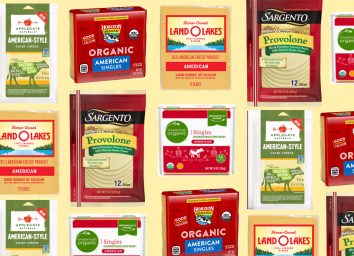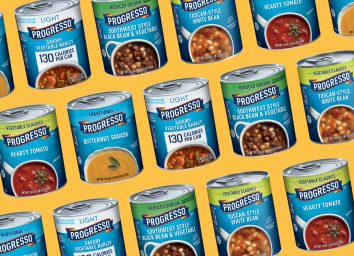10 Best & Worst Cheddar Cheeses, According to a Dietitian
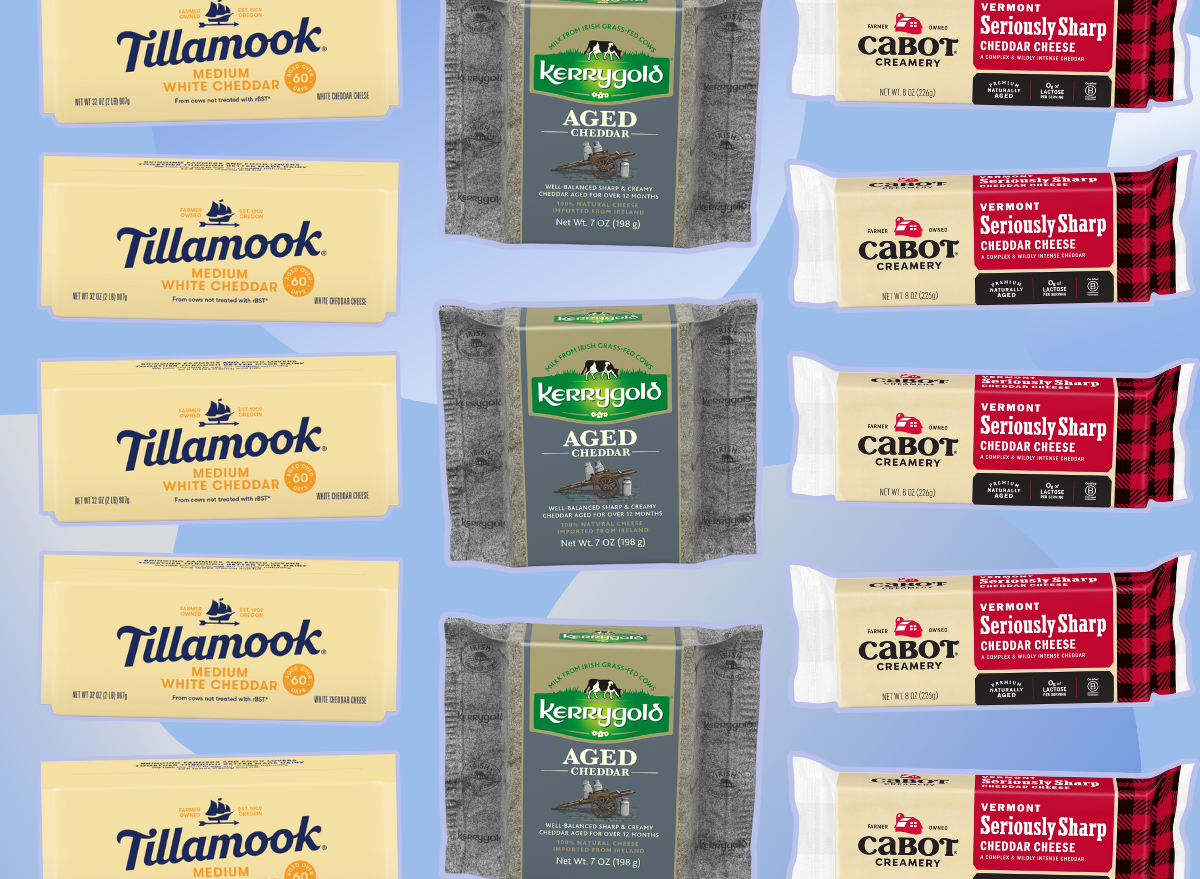
Americans love cheese—so much so that we consume an average of 37 pounds per person annually, according to the USDA. Among all the options, cheddar stands out as a favorite. It’s easy to find, affordable, and pairs perfectly with everything from mac and cheese to sandwiches.
Cheddar comes in a range of styles, from mild to extra sharp, so there’s something for everyone’s tastes and culinary needs. But when it comes to health, cheddar often gets a bad rap. It’s higher in sodium and contains about 5.5 grams of saturated fat per serving. Considering the American Heart Association (AHA) recommends no more than 13 grams of saturated fat daily, choosing healthy cheddar cheeses can really make a difference.
With so many cheddar cheeses out there, picking the healthiest ones can be tricky. While many dairy manufacturers have embraced healthier options, others still mask their low-quality cheeses with many additives and unnecessary artificial fillers. To help you out, we’ve identified the best cheddar cheeses based on three main criteria: lower sodium, high calcium, and no artificial ingredients.
How we chose the best cheddar cheeses:
We followed the below guidelines when choosing the best cheddar cheeses on grocery store shelves:
- Lower Sodium: Many cheese manufacturers—and this spans all cheeses, not just cheddar—tend to pump them full of sodium to preserve freshness and heighten flavor. Cheddar cheese typically has more sodium than other cheeses, which can be an issue if you’re watching your salt intake. The AHA suggests no more than 2,300 milligrams of sodium per day, with lower limits for some people. Too much sodium is a direct contributor to health issues such as hypertension, heart disease, and even early morbidity, depending on the severity. We focused on cheeses with less sodium to help keep these risks in check.
- High Calcium Content: Cheddar is a hard cheese, and hard cheeses generally have more calcium than softer ones due to concentrated calcium levels left over after the evaporation process. Calcium is key for bone health, and our top picks provide around 10% to 15% of your daily calcium needs per 1-ounce serving.
- No Artificial Ingredients or Colors: Many cheddars are loaded with artificial colors (hence why some brands are bright orange) and unnecessary additives such as anti-caking mixtures or ingredients that help the cheese melt evenly. While the effects of these additives are still being studied, it doesn’t hurt to leave these brands on the grocery shelves when we have so many natural choices. We chose cheeses without artificial ingredients, colors, or flavors, ensuring you get a high-quality product. (As a note, enzymes are natural and act as agents to turn milk into cheese curds, thereby separating the whey.)
Read on for our top healthy cheddar picks, and for more, check out 11 Cheese Brands That Use the Highest Quality Ingredients.
7 Best Cheddar Cheeses
Best: Cabot Seriously Sharp Cheddar Cheese
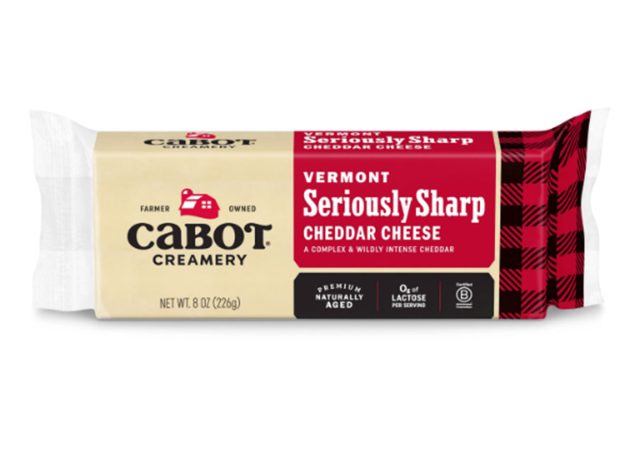
Calories: 110
Fat: 9 g (Saturated fat: 6 g)
Sodium: 200 mg
Carbs: 1 g (Fiber: 0 g, Sugar: 0 g)
Protein: 7 g
Cabot’s Vermont Seriously Sharp Cheddar Cheese is the perfect addition to your charcuterie board. It’s crumbly, firm, and offers a luscious nuttiness that many overly processed cheddar cheeses lack. Cabot’s cheddar cheese is also made with four wholesome, easy-to-read ingredients: milk, cheese cultures, salt, and enzymes. This cheese is pretty standard when it comes to both saturated fat and sodium levels, and without any added sugar, you’re really getting a top-quality product that presents cheese the way it should be.
Best: Kerrygold Aged Cheddar Cheese
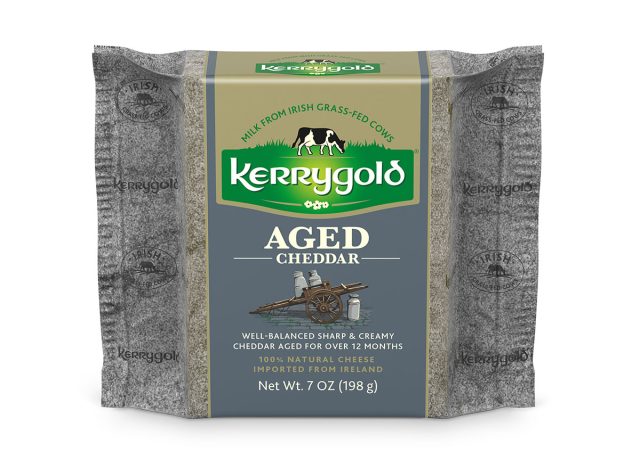
Calories: 110
Fat: 9 g (Saturated fat: 6 g)
Sodium: 210 mg
Carbs: 1 g (Fiber: 0 g, Sugar: 0 g)
Protein: 7 g
Kerrygold doesn’t just add good ol’ Irish robustness and quality to their butter but also their line of delectable cheeses! Their aged cheddar cheese is a pale yellow, hearty concoction that their website proudly boasts as the “The Holy Grail of cheddar cheese.” Kerrygold’s cheddar cheese provides 7 grams of protein per serving without an excessive amount of sodium and is made solely with milk, salt, cheese cultures, and enzymes—the four ingredients that seem to be the gold standard for all-natural, wholesome cheddar cheeses across the market.
Best: Organic Valley Grassmilk Raw Cheddar
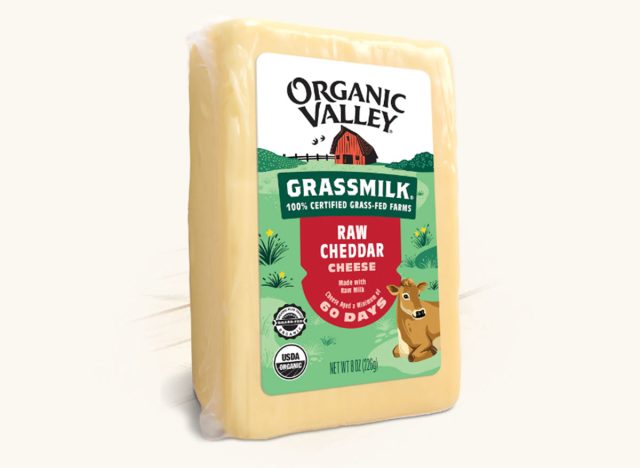
Calories: 110
Fat: 9 g (Saturated fat: 5 g)
Sodium: 180 mg
Carbs: 1 g (Fiber: 0 g, Sugar: 0 g)
Protein: 6 g
Aged a minimum of 60 days and the winner of the 2017 Los Angeles International Dairy Competition, Organic Valley’s Grassmilk Raw Cheddar is USDA-certified organic and has a delicious, robust taste. This organic cheese is made with the milk of 100% grass-fed cows (hence the color change throughout the year as the cows munch on a variety of different flora) and contains no antibiotics or synthetic hormones ever. We do want to note that this cheese isn’t fully “raw”—the milk used is heat-treated but not fully pasteurized. Because of this, it may not be the best choice for pregnant people, those with compromised immune systems, or those experiencing other conditions that require them to limit or avoid raw dairy.
Best: Sargento Extra Sharp Cheddar Cheese Snack Sticks
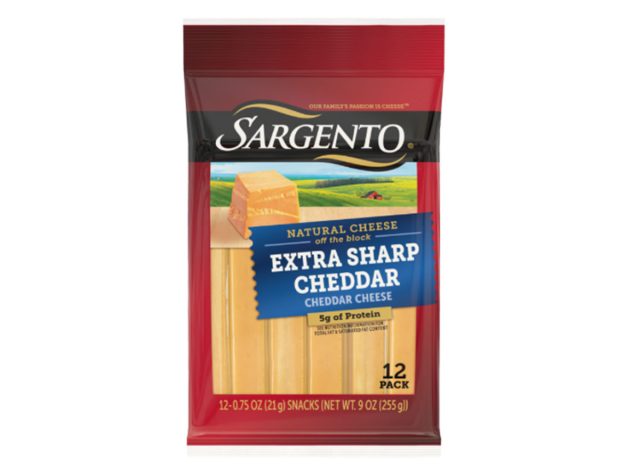
Calories: 90
Fat: 7 g (Saturated fat: 4.5 g)
Sodium: 140 mg
Carbs: 0 g (Fiber: 0 g, Sugar: 0 g)
Protein: 5 g
If you’re looking for a delicious on-the-go snack, consider grabbing a pack of Sargento’s Extra Sharp Cheddar Cheese Snack Sticks. At less than 100 calories a pop with 5 grams of fiber and 10% of your daily calcium needs, this is the perfect snack for adults and kids alike. The orange coloring comes from annatto, which is made from seeds from the achiote tree. This natural option bypasses unwanted artificial colorings to achieve that classic brightness. However, we want to note that certain populations may be allergic to this plant while others have experienced heightened IBS symptoms after consumption. If you haven’t experienced cruddy symptoms before, you’re probably in the clear.
Best: Tillamook Medium White Cheddar
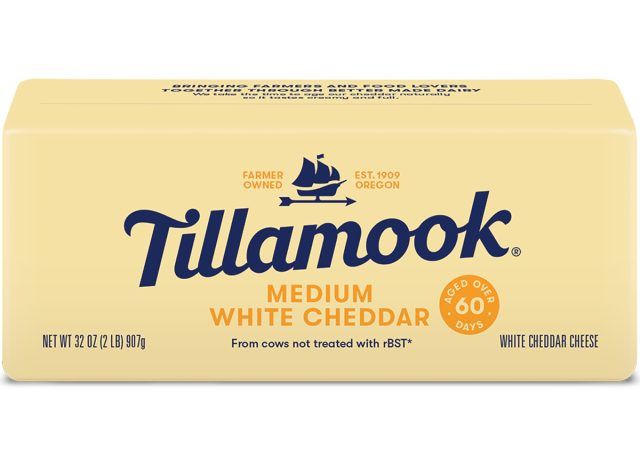
Calories: 120
Fat: 10 g (Saturated fat: 6 g)
Sodium: 200 mg
Carbs: 1 g (Fiber: 0 g, Sugar: 0 g)
Protein: 6 g
Tillamook’s Medium White Cheddar Cheese is a great option for those whose recipes and taste pallets don’t call for that extra-sharp flavor. This milder cheese is made with milk, salt, and enzymes and doesn’t include any artificial coloring, unlike many mainstream brands that insist on a neon-orange coloring to make it “true” cheddar. This cheese also provides 15% of your daily calcium needs per serving, which, as we all know, is an essential nutrient that aids in bone health and can help prevent bone diseases like osteoporosis in older age.
Best: Miyoko’s Creamery Plant-Based Roadhouse Cheddar Cheese Spread
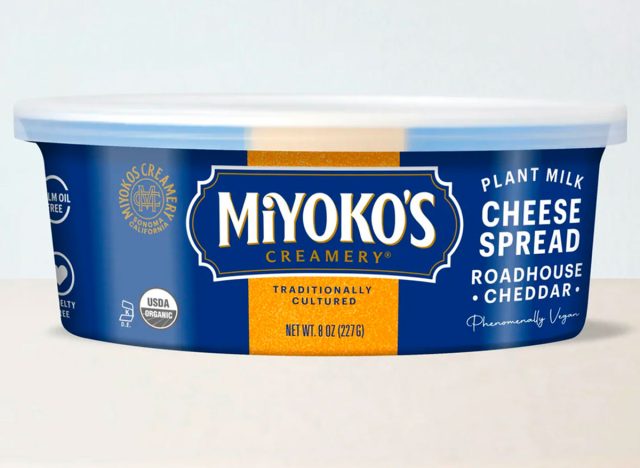
Calories: 90
Fat: 8 g (Saturated fat: 3 g)
Sodium: 140 mg
Carbs: 4 g (Fiber: 0 g, Sugar: 1 g)
Protein: 2 g
For those who follow a dairy-free or vegan lifestyle, you don’t have to miss out! Miyoko’s Creamery offers a delicious plant-based Roadhouse Cheddar Cheese Spread that goes great on your favorite cracker. Its bold, sharp flavor is made predominantly with cashew milk, coconut oil, and organic rice miso for that beloved tang. Additionally, this plant-based cheese provides less saturated fat and sodium than other brands and contains no added sugars. The trade-off, though, is less protein than dairy cheese, so remember to supplement your protein with other plant-based sources if following a vegan diet.
Best: Trader Joe’s Unexpected Cheddar Cheese
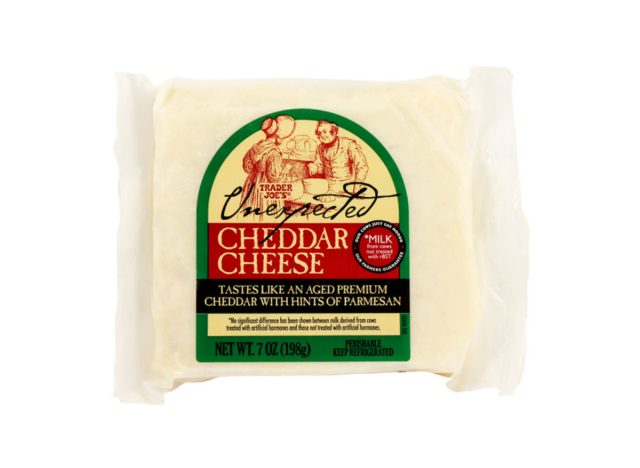
Calories: 110
Fat: 9 g (Saturated fat: 6 g)
Sodium: 180 mg
Carbs: 0 g (Fiber: 0 g, Sugar: 0 g)
Protein: 7 g
Trader Joe’s has everything, don’t they? Their Unexpected Cheddar Cheese looks and tastes just like aged cheddar, and as you chew, it begins to hint at a more tangy, crumbly texture akin to parmesan cheese. Although technically a cheddar cheese, you’re getting the best of both worlds, making it the perfect centerpiece for any cheese board. This cheese also contains slightly less sodium than the average cheddar cheese while maintaining a protein count of 7 grams per serving. Want to add some crunch? Roll this cheese in crushed or chopped pecans!
3 Worst Cheddar Cheeses
Worst: Velveeta Sharp Cheddar Cheese
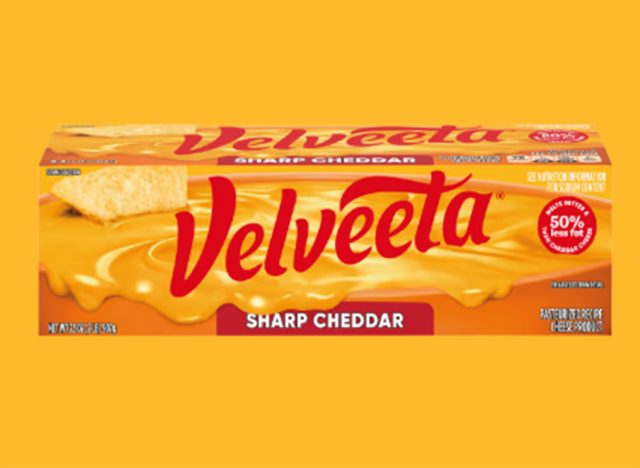
Calories: 70
Fat: 4 g (Saturated fat: 1 g)
Sodium: 400 mg
Carbs: 3 g (Fiber: 0 g, Sugar: 2 g)
Protein: 4 g
Perhaps it’s not so surprising that Velveeta’s Sharp Cheddar Cheese has clocked in at our number one spot for worst cheddar cheese. After all, there isn’t much in here to really constitute it as, well, cheese. With a whopping 400 milligrams of sodium (remember that the AHA recommends no more than 2,300 milligrams per day, so even two 1-ounce servings take up about 40% of your daily sodium limit), this cheese is filled with other extraneous ingredients such as canola oil, sodium phosphate, and modified corn starch—ingredients some may be trying to avoid.
Worst: Kraft Cheddar Cheese Block
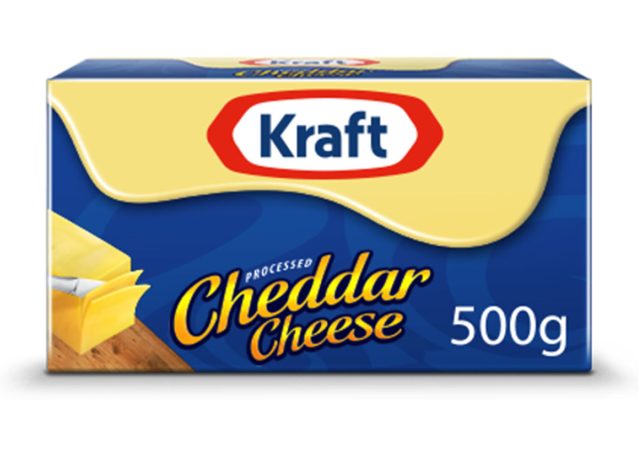
Calories: 81
Fat: 6.7 g (Saturated fat: 4.2 g)
Sodium: 427 mg
Carbs: 0.24 g (Fiber: 0 g, Sugar: 0.6 g)
Protein: 4.8 g
Kraft’s Cheddar Cheese Blocks may have fewer calories than other brands (note: their serving sizes are around 3.5 ounces instead of the standard 1 ounce), and it contains less saturated fat than most, but you’ll notice that the ingredient list is packed with strangely vague ingredients such as acidity regulators, preservatives, and just simply “color” accompanied by various different numbers and letters. Unless you’re a food scientist, it’s hard to understand this cheese’s nutrition label. If you are a loyal Kraft consumer, the Kraft Natural Cheese Signature Shreds Cheddar Blend may be a better choice.
Worst: Borden: Extra Sharp Cheddar Melts
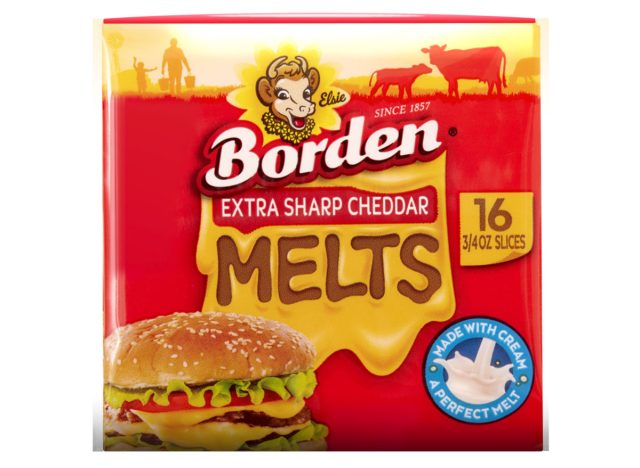
Calories: 60
Fat: 4.5 g (Saturated fat: 3 g)
Sodium: 270 mg
Carbs: 1 g (Fiber: 0 g, Sugar: 1 g)
Protein: 4 g
Borden’s Extra Sharp Cheddar Melts has a laundry list of ingredients like calcium phosphate, sodium citrate, gelatin, and a vague claim to “color added.” While it is unlikely that including this cheese in your balanced diet will have detrimental health effects, many other cheddar choices are made with more high-quality ingredients.
- Source: https://www.ers.usda.gov/data-products/dairy-data/
- Source: https://fdc.nal.usda.gov/fdc-app.html#/food-details/170899/nutrients
- Source: https://www.heart.org/en/healthy-living/healthy-eating/eat-smart/fats/saturated-fats
- Source: https://www.heart.org/en/healthy-living/healthy-eating/eat-smart/sodium/how-much-sodium-should-i-eat-per-day
- Source: https://pubmed.ncbi.nlm.nih.gov/33351135/
- Source: https://www.journalofdairyscience.org/article/S0022-0302(11)00552-2/fulltext
- Source: https://pubmed.ncbi.nlm.nih.gov/22432803/
- Source: https://pubmed.ncbi.nlm.nih.gov/19687751/
- Source: https://pubmed.ncbi.nlm.nih.gov/22609892/



